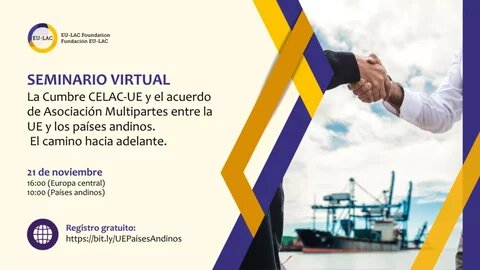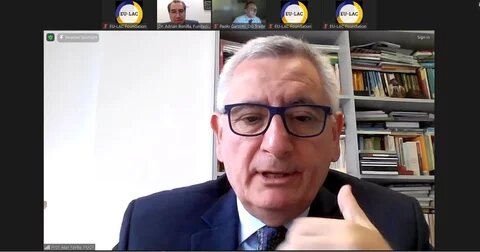
The opportunities and challenges observed during the 10 years of the Multi-Party Association Agreement between the EU and the Andean countries were analysed during a virtual seminar organised by the EU-LAC Foundation on 21 November. The seminar brought together more than 35 participants from academia, government, diplomacy, international organisations and business, both from Latin America and Europe.
In particular, the panellists analysed how the agreements reached at the III EU-CELAC Summit can contribute to broadening and strengthening the trade and investment agenda, as well as to inclusive social development. The seminar featured presentations by Dr Alan Fairlie, Professor at the Pontificia Universidad Católica del Perú, and Mr Adam Wisniewski, representing Mr Paolo Garzotti, Head of the Latin America Unit (D.2) in the European Commission's Directorate General for Trade.

Opening the dialogue, Dr. Adrián Bonilla, Executive Director of the EU-LAC Foundation, highlighted the great importance that the recent EU-CELAC Summit in Brussels had attached to updating, strengthening, modernising and/or ratifying the Association Agreements signed by the EU with the sub-regions or countries of Latin America and the Caribbean, taking into account the new demands of global trade and geopolitics. Similarly, he stressed the necessity of considering the Global Gateway initiative as a framework for investment and trade between the two regions, as it involves major capital investment in the respective territories.
Mr Wisniewski spoke from the Commission's perspective on the implementation of the Agreements through various mechanisms to strengthen trade networks. His intervention also clarified several questions from the audience on regulations that could potentially affect trade relations between the two regions, such as the new European regulation on deforestation-free products.
Dr Fairlie also referred to the factors that have changed in the 10-year history of the Multi-Party Agreements and that need to be taken into account in their implementation. According to the Professor, the global pandemic of Covid-19 and the subsequent economic crisis, coupled with a readjustment of the international order with the current conflicts in Ukraine and the Middle East, have redefined the needs of both regions and reinforced the importance of maintaining and strengthening the agreement with the EU.
The Secretary General of the Andean Community, Ambassador Gonzalo Gutiérrez Reinel, also contributed by highlighting some of the challenges that the agreements pose for the countries and for the Andean integration process.
This activity is part of the studies and dialogues conducted by the EU-LAC Foundation to exchange ideas on the mapping of the Association Agreements linking the two regions, among which a recent study has been produced and can be freely downloaded here.
